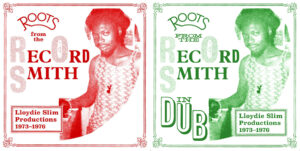Ian Preece’s latest record roundup comes from the Alpujarra mountains.
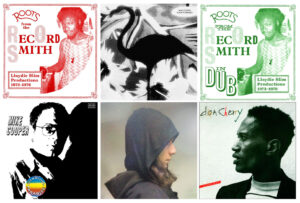
‘You’re heading for the mountain . . .’ sang Cornell Campbell and the Eternals in 1974. I can well imagine. Campbell’s plaintive vocal was lodged in my head in southern Spain recently, staying with an old friend John, who years ago sold his flat in Nunhead and now resides in a remote dwelling up in the Alpujarra mountains, east of Granada. You can’t really pop out for a pint of milk from up there: it’s 45 minutes to the nearest town, bouncing in the van down rutted tracks, past bushes of oleander, neat Moorish irrigation channels and vertiginous drops to the nearly dry river bed below; listening to a lot of Sun Ra through the van’s speakers, stopping halfway down the valley to adjust the nozzles of various sprinklers, then again on the way back up to ensure the walnut trees are getting a good soaking. That gunshot up above is José, from the next farm up, dealing with another wild boar. Above all, everything is beautifully quiet. Thursday morning is market day in the small town of Orgiva – well, craft market day: local hippies and creative folk selling tie-dyed t-shirts, scarves, honey and artists’ pencils; everyone eating tostada con tomate then downing a cold frothy glass of Victoria Malaga beer, before heading up back into the hills.
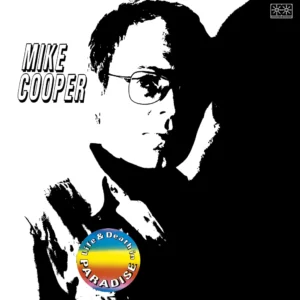
I know this is kicking the canon, but I struggled somewhat with my reading material for the short trip: Jan Morris’s Spain, full, as it is, of ‘hopeful’ rivers (?!), ‘adorable little mosques’, ‘olive trees that incline their fruit towards the market’ and general aerated prose style (‘Even the most determinedly flippant tourist, taking an afternoon excursion from Madrid [to Toledo], usually feels it necessary to cast an eye over this celebrated city, provided of course she can get back by cocktail time . . .’). Much more on the nose and down to earth are Mike Cooper’s new sleevenotes to his 1974 LP Life and Death in Paradise, just reissued by the ever-excellent Paradise of Bachelors. Cooper, bruised and exhausted with the bullshit of the mainstream music industry following the hard work, mixed reception and less than earth-shattering sales of his first couple of albums, retreated to a friend’s place in Almuñécar, directly south of Granada on the coast. (That in itself is hard to comprehend given the beautiful wistful country blues of tracks on Places I Know like ‘Three Forty-Eight (Blues for or Against Andaluscia)’, ‘Time to Time’ and ‘Broken Bridges’, complete with mournful piano and elegant strings and French Horn arrangements by Mike Gibbs – in places a kind of Reading, Berkshire, version of Loaded; in others, the natural successor to Bryan Ferry stringing ‘roses round your door/growing potatoes by the score’.)
Cooper arrived in the years before the likes of Freddie Laker started dumping holidaymakers by the bucket-load in Torremolinos, when you could catch mules bearing sugar cane trundling down dusty roads, and the indigenous fruit was the custard apple (rather than today’s overheated polytunnels maximising peach and tomato yields for the canning complexes). One night, through various ex-pat connections, Cooper ended up having dinner with Tony Hall, a name in the jazz world, who was starting a new label, Fresh Air. One thing led to another, a flame was rekindled and Life and Death in Paradise was recorded back in London, Hall acquiescing to Cooper’s desire to record with South African jazzers, drummer Louis Moholo and bassist Harry Miller, as well as alto saxophonist Mike Osbourne. That’s a hip quartet who inject just the zest that means Life and Death in Paradise manages to successfully fuse a kind of jazzy openness with the rock mores of the day. The result is a slightly glammed-up version of Cooper’s own Machine Gun Co. – heard muffled through the lounge-bar wall you could mistake it for Hunky Dory, Andy McKay’s saxophone squall on Roxy Music, or the bittersweet yearn of Big Star. I love how the title track fades in, then abruptly ends like someone’s shot the recording engineer; the opening of ‘Black Night Crash’ has a magnificent For Your Pleasure vibe before a long wild coda.
Melody Maker described the LP in terms of ‘great sounds for killing a cat’ – the reviewer, Cooper notes, ‘still had his head stuck up his folky rear end’. John Peel championed it, but there were other ‘shit reviews’; Cooper and his wife broke up, and before he knew where he was Cooper was back in Spain painting empty swimming pools and making leather bags and artworks which he sold at the market in Málaga, and probably places like Orgiva. This time, that was it: fuck the music industry and all who sail in that boat. While painting those empty pools Cooper only had two records with him: Television’s Marquee Moon and Pharoah Sanders’ Izipho Zam. Yet, strangely enough, while reading these sleevenotes backwards and out of sequence I found myself nodding with authority: yes, you can definitely hear on Life and Death in Paradise the strain, the cosmic-scrabbling/searching/questing-with-feet-still-firmly-grounded-in-the-struggle-on-the-street that you might expect of a Pharoah Sanders or Tom Verlaine (even though those albums cropped up later in Cooper’s life).
When not standing in an empty swimming pool with a paintbrush, Cooper found himself spending long afternoons lobbing small stones into a tin can on the rocky shore at Almuñécar. This led to an early life lesson: ‘I discovered the less I thought about it, the more success I had in getting them in. The trick was not to think about it at all. I had reached that kind of Zen archery paradox. Applying that to music could be a challenge, I thought . . . or maybe not.’
*
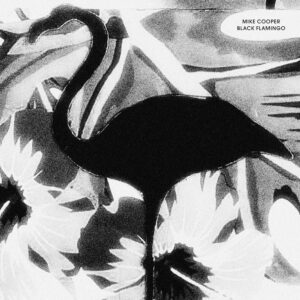
Nearly half a century on, I’ve been skipping and dipping through Mike Cooper’s sound collages, chiefly those released in recent times on Australia’s fine cornucopia of experimentalism, Room 40. In the introductory booklet of collaged artwork that comes with Oceans of Milk and Treacle Cooper describes his audio bricolages as ‘exotica, jazz, free jazz, electro acoustic lap steel; found sounds juxtaposed with voices from afar sent by friends and glued together with saxophone solos all from different continents . . . all this is mixed together to form An Ocean of Milk and Treacle, to be churned together to make another world’. I’m somewhat addicted to the eerie subaqueous tinkle, gurgle and moan of ‘A Chart of the Wet Blue Yonder’, the bassy, post-punk jazzy thrum and loungey sax of ‘Boogie Boards and Beach Rubbish’ and the lovely soft drum loop of ‘Dreaming on Earth’; as well as the dreamy sax drifting over birdsong of the gorgeous title track. This summer’s Black Flamingo is possibly even more striking, made up of languid, noirish, what used to be termed ‘fourth world’ atmospheres when tagged to a gloopy, fevered Jon Hassell record. All of that applies here: lovely baritone sax washes over programmed drum beats to lend ‘Beneath These Waves’ a kind of 1980s hothouse vibe; the smoky/squally tenor sax of long-term collaborator Geoff Hawkins is smeared beautifully all over the title track; ‘Transcendence Dub’ could be off one of those Macro Dub Infection compilations from the nineties – or a kind of Mille Plateaux illbient/rubbery funk meets the sticky dancefloor of ‘Sensoria’ and downtown NY edginess of Elliot Sharp’s growling bass clarinet. That’s followed by the beautiful interweaving curlicues of Michael Thieke’s clarinet and Cooper’s guitar on the plaintive ‘Lucernaga’. Much of the album is broken up with skronky, clonky interludes entitled ‘Sun Ra Socks and a B Flat Hat’ – and the absolute highlight is a lovely cover of Sun Ra’s ‘The Satellites are Spinning’, Cooper’s lonesome almost-croon travelling the spaceways before twisting and firing off with Aaron Hawkins’s tenor sax like a distant supernova; it would have sat beautifully on David Toop’s Ocean of Sound, Volume 2: Crooning on Venus.
*
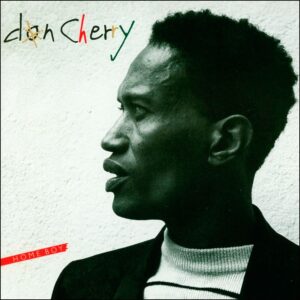
If you’d told this Jesus and Mary Chain acolyte back in the day that one of his most-spun records of the summer of 2023 would be Don Cherry’s jazz-funk chef-d’oeuvre Home Boy (Sister Out), recorded in Paris in the summer of 1985, he’d have . . . well, certainly raised an eyebrow from behind his copy of Ablaze. But this is the river life carries you down. To say ‘jazz-funk’ masterpiece doesn’t quite begin to cover it, either: there’s doo-wop (‘Call Me’); the James Brown-propelled ‘I Walk’; rap on ‘Alphabet City’ and, obviously, ‘Rappin’ Recipe’ (where Don moves from the ingredients of sweet potato salad to a simultaneous take down of, and high-five to, a ‘zippie’/hipster’s record collection – ‘oooh, look at those recuds: Thelonius Monk, and an Ornette Coleman recud, ain’t that something; he’s got some recuds, he’s got some 45s: Duke Ellington, and a MODERN. JAZZ. QUARTET recud!!’); reggae grooves that explode into Latin rhythms (‘Reggae to the High Tower’); mellow African flavours with the woody resonance of the doussou n’goni on ‘Bamako Love’ (Soundohm describe the album as embodying ‘the spirit of “Sono Mondiale”, the multi-ethnic sound of 1980s Paris, pioneered by Radio Nova and Celluloid Records’) – all smeared throughout with daubs of Cherry’s gorgeously plangent pocket trumpet, and, of course, Don singing. Another cut-up brother Brion Gysin is in there mumbling about addiction too. It’s a crazy, infectious, slightly wild and irreverent ride – you’re never quite sure how seriously Cherry is taking it all; how strung out he might have been (‘Don had absences; he’d even fall asleep in the bass drum sometimes’); how sniffily the jazz beards of the day might have reacted. Ahmet Ertegun turned it down it at Alantic records, so producer/guitarist Ramuntcho Matta (half-brother of artist/‘anarchitecture’ dismemberer Gordon Matta/son of Chilean surrealist Roberto) took it to Barclay Records in Paris – their cover looked like a hip flyer for some cool happening at the still newish Pompidou Centre. Hats off to Paris label We Want Sounds for repressing all this intact, adding extra tracks and spreading the word with great sleevenotes by French music scribe and Libération correspondent Jacques Denis, who deems Home Boy (Sister Out) ‘much bigger than the sum of its parts, representing the soul of a gleaner of sounds, the “fragments of a lover’s discourse”, with echoes of Indian ragas as well as the Watts Prophets . . .’ I can’t top that, other than to add, the absolute earworm that’s been trapped in my head all summer is a slightly eighties, minimally powered-up version of ‘Butterfly Mind’ – Moki Cherry’s elegiac etude last heard unplugged on Organic Music Theatre: Festival de Jazz de Chateauvallon 1972 (reissued by Blank Forms in 2021). Both versions of ‘Butterfly Mind’ seem to encapsulate the beautiful sadness of a lost world that didn’t quite come to fruition (the peaceful vibes and creativity-first ethos of Don and Moki’s Swedish school for kids) or, rather, didn’t quite achieve permanence (the horror of the Cold War/Reaganism destroying any hippy dreams; the pair splitting up later in the eighties).
*
Blank Forms are the Brooklyn-based label/publisher/platform who – in co-instigating and curating the touring Moki Cherry exhibition of tapestries/appliqués/mandalas/films/photos and notebooks (currently at the ICA); and in publishing the excellent Organic Music Societies book – have done much to restore Moki’s perhaps previously unsung but much deserved reputation as not only the engine but also the driver, keeping much of the Cherry charabanc (young Neneh, Eagle-Eye, Don and all) on the road in the seventies and eighties. That was no mean feat: constantly lumping gas cookers into minivans; sorting digs and train tickets across Europe and America; kitting out Don in her super-cool homemade multicoloured jumpers; running a free music school for Swedish kids; stitching a banner; cutting a tapestry; making films; writing poetry; rustling up a chicken curry; being a mum and road manager – all the while simultaneously absorbing a galaxy of music from Turkey to Mali to India and providing harmonies and tanpura for Don’s records and performances, as well as treading the streets in search of gallery spaces to exhibit your own work . . . Moki was no slacker (ICA exhibition is still on until the 3rd September).

One of Blank Forms’ other 2023 releases has an album-of-the-year feel. As Boomkat have pointed out, ‘naming yourself after your phone number isn’t the best way to get traction online’, but 7038634357 (703 for short) has probably taken the wise decision to fuck all that brand-building nonsense. 703 is from somewhere in Virginia, and Neo Seven is their seventh release – it’s a study in quietly composed perfection: understated wafts and occasional razor-bursts of distorted sound a la Fennesz; pristine but fragile electronic melodies; a general low-lit wet-summer ambience; all beautifully arranged around a minimal palette. Think of some of the most quietly beautiful records you’ve heard – the rain-smeared lens of Burial or Grouper; the bruised longing on Dedekind Cut’s Tahoe; the cosmic quietude of Stars of the Lid; the crackle through the ionosphere of early Oval; the lunar wonder of Eno’s ‘An Ending (Ascent)’; the everyday saudade of Tindersticks’ 35 Rhums; the languid pools of Yann Novak’s The Voice of Theseus; the blurry static and watery muffle of Ana Roxanne’s ‘It’s a Rainy Day on the Cosmic Shore’; the hushed splendour of Lisa Lerkenfeld’s Collagen – and Neo Seven has quietly taken up a spot over there in the corner too. It’s an electronic/digitally produced record, but for ultimate vinyl warmth place the needle on the record: as Blank Forms allude to in the Bandcamp blurb, at times the ‘soft noise’ is indistinguishable from the patina of dust crackle that builds up in the grooves.
*
To cycle back to the start: the Cornell Campbell and the Eternals who were ‘Heading for the Mountain’ are of the more wistful-sounding era of ‘Stars’ rather than the slightly heavier manners of ‘Natty Dread in a Greenwich Farm’ or ‘100 lb of Collie’. Roots from the Record Smith: Lloydie Slim Productions, 1973–1976, the recently repressed Digikiller LP collecting ‘. . . Mountain’ and other Lloydie Slim productions from the mid-seventies has plenty of songs searching for a way out, not least the mellifluous upfulness of Ronnie Davis, living in unity, and in a world he’s created for himself (I wonder if Secret Affair were secret Ronnie Davis/Lloydie Slim fans?); all wistful yearn mixed with bubbling organ trills. There’s also soul-tinged shufflers like Hortense Ellis’s ‘Mr Lee, Mr Lee’, proto-steppas (Ronnie Davis again with ‘Jah Jah Jahovah’) and darker-edged rootsman revive (Tappa Zukie’s ‘Judge I O Lord INRL’). Now – praise Jah – Digikiller have issued a dub companion to this compilation. If I could only go back to a lawn in Tivoli Gardens in 1975 and hear Ronnie Davis’s impassioned ‘Power of Love’ . . . then to hear the thunderously heavy skank of ‘King Tubby’s in Fine Style’ version flipping the faders into the red . . . The whole of Roots from the Record Smith in Dub is superb – especially excellent is the reworking of I Roy’s trenchant ‘Look A Boom’, with a soulful version on the first LP, The Heptones’ ‘Tripe Girl’, now furnished with excellent bathwater effects on a Lloydie Slim and Agrovators dub (‘Version Stormy Weather’) that rides a monster groove. To misappropriate from the excellent Honest Jon’s notes by the 45s on their website: ‘total roots murder’.
